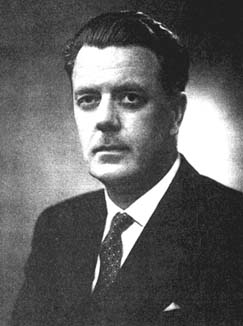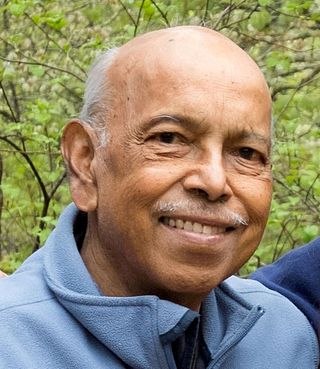Related Research Articles
Multivariate statistics is a subdivision of statistics encompassing the simultaneous observation and analysis of more than one outcome variable, i.e., multivariate random variables. Multivariate statistics concerns understanding the different aims and background of each of the different forms of multivariate analysis, and how they relate to each other. The practical application of multivariate statistics to a particular problem may involve several types of univariate and multivariate analyses in order to understand the relationships between variables and their relevance to the problem being studied.

Sir Maurice George Kendall, FBA was a prominent British statistician. The Kendall tau rank correlation is named after him.

Mathematical statistics is the application of probability theory, a branch of mathematics, to statistics, as opposed to techniques for collecting statistical data. Specific mathematical techniques which are used for this include mathematical analysis, linear algebra, stochastic analysis, differential equations, and measure theory.

Raj Chandra Bose (or Basu) (19 June 1901 – 31 October 1987) was an Indian American mathematician and statistician best known for his work in design theory, finite geometry and the theory of error-correcting codes in which the class of BCH codes is partly named after him. He also invented the notions of partial geometry, association scheme, and strongly regular graph and started a systematic study of difference sets to construct symmetric block designs. He was notable for his work along with S. S. Shrikhande and E. T. Parker in their disproof of the famous conjecture made by Leonhard Euler dated 1782 that for no n do there exist two mutually orthogonal Latin squares of order 4n + 2.

Calyampudi Radhakrishna Rao was an Indian-American mathematician and statistician. He was professor emeritus at Pennsylvania State University and research professor at the University at Buffalo. Rao was honoured by numerous colloquia, honorary degrees, and festschrifts and was awarded the US National Medal of Science in 2002. The American Statistical Association has described him as "a living legend" whose work has influenced not just statistics, but has had far reaching implications for fields as varied as economics, genetics, anthropology, geology, national planning, demography, biometry, and medicine." The Times of India listed Rao as one of the top 10 Indian scientists of all time.

Debabrata Basu was an Indian statistician who made fundamental contributions to the foundations of statistics. Basu invented simple examples that displayed some difficulties of likelihood-based statistics and frequentist statistics; Basu's paradoxes were especially important in the development of survey sampling. In statistical theory, Basu's theorem established the independence of a complete sufficient statistic and an ancillary statistic.

Indian Statistical Institute (ISI) is a public research university headquartered in Kolkata, West Bengal, India. It was declared an Institute of National Importance by the Government of India under the Indian Statistical Institute Act, 1959. Established in 1931, it functions under the Ministry of Statistics and Programme Implementation of the Government of India.
Quantitative psychology is a field of scientific study that focuses on the mathematical modeling, research design and methodology, and statistical analysis of psychological processes. It includes tests and other devices for measuring cognitive abilities. Quantitative psychologists develop and analyze a wide variety of research methods, including those of psychometrics, a field concerned with the theory and technique of psychological measurement.

Samarendra Nath Roy was an Indian-born American mathematician and an applied statistician.
Statistics, in the modern sense of the word, began evolving in the 18th century in response to the novel needs of industrializing sovereign states.
Repeated measures design is a research design that involves multiple measures of the same variable taken on the same or matched subjects either under different conditions or over two or more time periods. For instance, repeated measurements are collected in a longitudinal study in which change over time is assessed.
Algebraic statistics is the use of algebra to advance statistics. Algebra has been useful for experimental design, parameter estimation, and hypothesis testing.
In mathematics, an orthogonal array is a "table" (array) whose entries come from a fixed finite set of symbols, arranged in such a way that there is an integer t so that for every selection of t columns of the table, all ordered t-tuples of the symbols, formed by taking the entries in each row restricted to these columns, appear the same number of times. The number t is called the strength of the orthogonal array. Here are two examples:

Ramanathan Gnanadesikan was an Indian statistician, known for his work in multivariate data analysis and leadership in the field. He received his Ph.D. at the University of North Carolina and headed research groups in statistics at Bell Laboratories and Bellcore. He was a fellow of American Association for the Advancement of Science, American Statistical Association, Institute of Mathematical Statistics and Royal Statistical Society, and elected member of the International Statistical Institute. He served as President of Institute of Mathematical Statistics and the International Association for Statistical Computing, the latter of which he helped found.

Gábor J. Székely is a Hungarian-American statistician/mathematician best known for introducing energy statistics (E-statistics). Examples include: the distance correlation, which is a bona fide dependence measure, equals zero exactly when the variables are independent; the distance skewness, which equals zero exactly when the probability distribution is diagonally symmetric; the E-statistic for normality test; and the E-statistic for clustering.
Pranab Kumar Sen was an Indian-American statistician who was a professor of statistics and the Cary C. Boshamer Professor of Biostatistics at the University of North Carolina at Chapel Hill.
Pandurang Vasudeo Sukhatme (1911–1997) was an Indian statistician. He is known for his pioneering work of applying random sampling methods in agricultural statistics and in biometry, in the 1940s. He was also influential in the establishment of the Indian Agricultural Statistics Research Institute. As a part of his work at the Food and Agriculture Organization in Rome, he developed statistical models for assessing the dimensions of hunger and future food supplies for the world. He also developed methods for measuring the size and nature of the protein gap.
Fang Kaitai, also known as Kai-Tai Fang, is a Chinese mathematician and statistician who has helped to develop generalized multivariate analysis, which extends classical multivariate analysis beyond the multivariate normal distribution to more general elliptical distributions. He has also contributed to the design of experiments.
References
- ↑ From the Dept. of Statistics, Colorado State University Archived 2008-05-12 at the Wayback Machine
- ↑ Morgan J. P., Ghosh S. & Dean A. M. (2014). J. N. Srivastava and experimental design. J. Statist. Plan. Infer. 144, 3–18.
- ↑ Srivastava's Ph.D.
- ↑ Some Prehistory of the Department of Statistics and Statistical Laboratory at Colorado State University [ permanent dead link ]
- ↑ Multivariate analysis, design of experiments, and survey sampling By Subir Ghosh, Jagdish Narain Srivastava, CRC Press, 1999
- ↑ International Conference in Honor of the late Jagdish Srivastava, Optimal Design of Experiments - Theory and Application